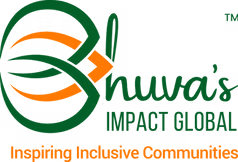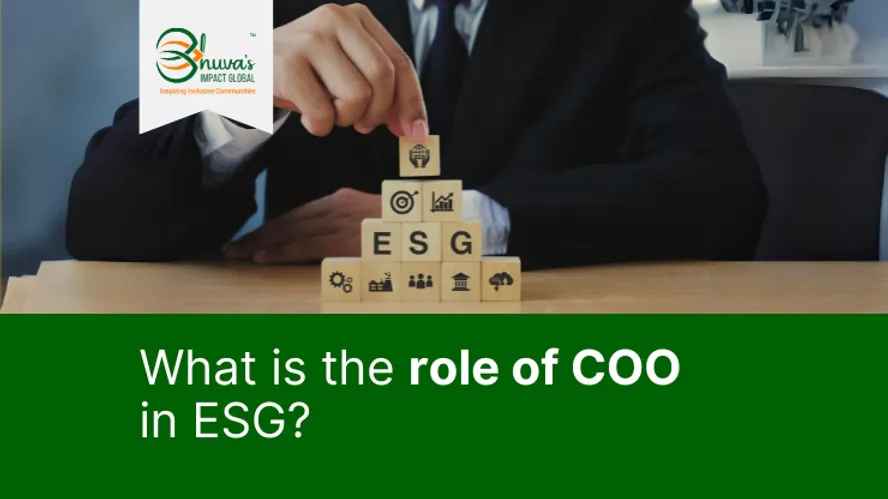The field of corporate operations is multidimensional today. In addition to monitoring efficiency, productivity, and keeping tabs on cash flow and financial performance, the modern COO has to take into account ESG (environmental, social, and governance) issues.
Learn what exactly ESG is, how it affects the operations of your startup, the responsibilities a COO has over ESG issues, and how ESG risk management can enhance the financial performance of your business.
Scroll down and read more from the BIG blog if you want more information on what a fractional COO is and how these professionals leverage their knowledge to achieve ESG and DEI goals`

What is the role of a COO in ESG?
First, a little about ESG
Before we delve into what a COO’s role is in ESG, let’s take a look at what exactly it is.
According to the Corporate Finance Institute, ESG is “a management and analysis framework to understand and measure how sustainably an organization is operating.”
Key to this definition is the word “sustainability.” Unfortunately, there is no single universally accepted definition on what sustainability is. This is not necessarily a bad thing.
Sustainability is going to look different for an ed tech company versus a clothing manufacturing startup versus a rideshare app because none of these businesses fall into the same category of commercial activity.
With its origins in the 1990s, ESG is a relatively new concept in the business world. Now, 30+ years later, it’s a hot topic. There are ESG courses and conferences held every year. In fact, we’ve previously discussed the top 23 sustainability & DEI speaker-recommended conferences that you should read after reading this article.
There is currently no single framework, or qualitative description and recommendations, that dominates the landscape. ESG standards, which can be based on one or more frameworks to provide a uniform and typically more quantitative basis of comparison between different groups, have been created by a myriad of organizations. Frameworks and standards are generally selected by a business by its discretion, and a business prepares its own report in reference to its compliance with a particular ESG standard.
If this is not already confusing enough, to take things a step further, companies can even be ranked and rated on their ESG performance by third-party entities based on the information within the public domain, such as annual reports and any ESG reports which they have made public.
These rankings and ratings are often produced without any say from the companies being evaluated, and are often provided to investors.
At the moment, in most of the world ESG reporting and compliance with a particular standard is largely voluntary with the exception of the European Union. The EU is the leading political force in legally mandating corporate sustainability reporting. Beginning this year, large companies and listed companies doing business within the EU, regardless of their geographic origin, are required to regularly report on their ESG risks and the impact those risks have on people and the environment.
As of February 2024, the EU has gone even further to develop a provisional agreement on ESG ratings across the bloc.

The COO’s role in ESG
It would be erroneous to think that ESG reporting should be simply relegated to a junior employee or a summer intern and that an ESG report is simply a deliverable produced simply for the benefit of being able to say that your company has one on hand. The information that is gathered during the process of reporting is simply too valuable to file away!
The COO is widely regarded as the individual who develops and implements ESG strategies by quantifying, qualifying, or certifying the data and creating a culture of due diligence around the supply chain and prioritizes sound and equitable governance principles.
By viewing and understanding the company’s impact on the environment, society at large, and its internal governance, a COO is able to optimize financial performance and lower risks, both in the near term and far into the future.
Also, at the end of the day, what happens in an organization is largely determined by the COO. A COO can streamline operations to ensure that leadership is effective and policies and procedures are robust, and equally important, are being followed.
How can a fractional COO help you with ESG
Some questions you might be asking yourself right now are –
How do I have the time to choose an ESG framework and a reporting standard, much less collect the data to adequately prepare a report?
Will I have to hire a full time employee to handle all of this paperwork?
Why should I care about what’s going on in the EU?
An experienced Fractional COO can work with you to select the most relevant framework and reporting standard(s) for your industry.
And no, for startups and SMEs, it is not necessary to onboard a full time employee to stay on top of it all. While the word “report” implies writing, the bulk of the work behind preparing one is data collection. Your Fractional COO can help you choose digital solutions which are both cost effective and which enable either periodic or real-time data collection, often which are oriented toward the reporting standard of your choosing.
A Fractional COO with experience in your field is also going to have a handle on the ESG ranking and rating systems. In addition to providing assistance in ESG reporting, your fractional COO can also advise you on the preparation of other materials you release into the public domain and how those can affect your standings. This, in turn, can aid in attracting future funding and even personnel, as increasingly employees factor in corporate responsibility and reputation in their job search.
Finally, if your startup is outside of the European Union, the legislation coming out of the EU mostly affects very multinational large players doing business within the bloc (think: Microsoft, Apple). Current AI policies, legislation, and regulations in the EU give us an insight on how the bloc tackles small and large companies incorporating AI into their business practices: this aspect of business is also certainly something that a COO needs to keep an eye on.
However, as the momentum in Brussels continues to grow, it is only a matter of time before EU laws eventually influence laws in other parts of the world.
Also, while you may not have a customer base in Europe at the moment, that doesn’t mean you won’t have one down the line. A Fractional COO with an understanding of EU ESG regulation can help future-proof your business for a time when compliance ESG reporting laws may be necessary.
But are you a non-US-based business looking to expand into the US market? Then download our FREE guide below that covers integrating AI into your risk management and leveraging that to expand into the USA.
ESG risk management strategy
ESG reporting may seem like a punishment when in actuality it should be looked at as a reward. The information gathered as a report of collecting data and assembling an ESG report will enable your organization to perform forecasting beyond the traditional tools of corporate finance.
How? Because environmental, social, and corporate governance aspects are all weighted equally, ESG management and reporting is a fantastic tool for managing risk to your startup’s financial performance and reputation. Essentially – in 2024 and beyond – ESG metrics are crucial risk metrics in risk management.
Why? Risk assessment is a necessary component for any ESG reporting procedure. And because ESG is a means of examining the direct and indirect negative and positive effects of an organization on the natural environment, society, and the governance within that organization, it serves as both a mirror and a crystal ball.
A comprehensive ESG report, especially one which accounts for universal and sector specific attributes, will have named the risks a company has across all three domains and what the leadership plans to do to reduce these risks. Your Fractional COO is going to use this information and find ways to implement the reduction or total elimination of these risks across the organization through its day-to-day operations.
Let’s look at some risks across the environmental, social, and governance domains and some potential solutions a Fractional COO would develop.

Environmental risks
Let’s say your startup is in logistics and transportation.
Lowering your negative impact on the environment could mean increasing the number of electric vehicles you own or lease. With increasing incentives and subsidies from jurisdictions across the globe to electrify transport, plus with the elimination of a source of fuel costs, means that you could have both an increased positive financial impact while lowering your direct negative environmental impacts.
A real world example of this is the option Amazon now provides shoppers to have certain items shipped to them in their own packaging, to reduce packaging waste and extra time and costs associated with handling by employees, and wait later to elect to have all items shipped to them at one time as part of one package in return for a digital reward.
Social risks
For the social component of ESG, let’s consider a manufacturing startup which currently receives components made in a foreign country with poor protections against child labor.
For this startup, continuing to use this supplier could pose an indirect reputational risk to your firm if it is indeed found that child labor is being used. A solution your Fractional COO may offer is to look for an alternate supplier that has been certified not to have any children laboring in its facilities or suggest an entity in another country where the scourge of child labor is not present and eliminate this risk altogether.
Even better, if there is a domestic supplier with a spotless reputation which can produce this component for a competitive price, eliminating this risk can reduce risk in the environmental domain as well.
Governance risks
And last but not least, governance risks are the types of risks that can destroy organizations that have been around for decades or even longer from the inside out.
Have you ever received a notice that your credit card or health information has been compromised? A common governance risk across sectors is protection of customer data. If within your assessments you come to understand that your technology is falling behind, your Fractional COO will work with you to develop a plan on how to modernize your systems and even better, how to prepare yourself for a host of scenarios, including a technology provider going out of business or no longer supporting your systems. That way, by reducing this risk, the financial performance of your company will be secured by maintaining the customer base.
Because every organization is made of people, governance risks will often dovetail with social risks. Other governance risks include issues such as the demographic makeup of advisory boards and boards of directors and where a company invests heavily in.
Leverage your ESG and DEI goals with strategic board leadership

If your tech startup has reached the significant milestone of $1 billion USD in annual recurring revenue (ARR), now is the critical time to advance your ESG and DEI initiatives. Whether you’re looking to enhance existing ESG reporting and risk management processes or you’re just beginning to explore these areas, Bhuva Shakti’s leadership can provide the guidance you need.
With a deep understanding of global markets and a multidisciplinary approach, I am well-equipped to help your company navigate the complexities of ESG and DEI, ensuring that your initiatives are not only compliant but also impactful. My international experience and strategic oversight will position your company as a leader in sustainable and inclusive business practices.
Connect with me to explore how my board membership can help your organization achieve its sustainability and inclusivity goals, while driving long-term growth. Join the ranks of leading tech companies that have benefited from my insights and leadership.


